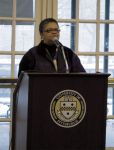What better way to usher in the beginning of Black History Month than with a celebration? The University of Pittsburgh’s Department of Africana Studies celebrated its 40th anniversary on campus in the William Pitt Union Jan. 30.
 |
|
BRENDA BERRIAN
|
The Africana Studies department has seen many changes over the past 40 years, beginning with its name, which was the Department of Black Studies when it was established in 1969. Positive changes the department has seen are the expansion of the department’s curriculum to include the study of Caribbean and African cultures and histories as well as African-American culture and history, and the enrollment of non-African-American students has increased to the point where some classes will have as much as 70 percent non-Black students in attendance, said department chair, Brenda Berrian.
“I’m glad to say we are now open to and attracting students of all races here at the University of Pittsburgh,” said Berrian. “And that’s the whole purpose. We teach in a predominantly White university so our courses are supposed to be for all students, not just for Black students.” I think what helps is that our courses fulfill what the university calls ‘general education requirements to graduate,’ and I think that’s what’s attracting them,” she explained.
Because students increasingly want to study abroad, they will take courses like Francophone Africa, which Berrian teaches, in order to get the cultural, political and historical background they need to prepare them to go study in Caribbean nations, like Haiti, or in African nations, like Senegal or the Côte d’Ivoire. Berrian’s Francophone Africa class has also attracted foreign students, “which adds another dimension to the class,” she added.
“We do have some very sophisticated instructors who have connected globally, and that keeps it rich,” said professor emeritus and founder of the Kuntu Repertory Theatre, Vernell A. Lillie PhD, who started teaching at the university in 1972.
One negative change that Berrian has seen since she first started teaching back in 1976 is the decline of full-time faculty from 11 to 7, which has had a negative impact on enrollment. Although the Africana Studies department wasn’t the only one to suffer cuts, as Berrian put it, it’s more noticeable in a small department than in a larger one with 30 or more faculty members.
Berrian noted that some major accomplishments African-Americans have seen in general are, of course, the election of the first African-American president, Barack Obama, “an increase in the number of African-American women as ambassadors assigned to African and European countries, and more African-American professors getting the chance to lecture for the state department in embassies across the world.”
Lillie had a less optimistic opinion. “We’re still struggling for an entrance into this society. The election of a man who’s Black as president has not changed that,” she said.
Gail Austin, director of the Academic Resource Center at the university, was a part of the student movement in 1969 but didn’t participate in the computer room takeover. Like Lillie, she believes that African-Americans still haven’t “arrived” in U.S. society. “African-Americans are still, by and large, second-class citizens and aren’t progressing as quickly as their White counterparts,” she said. “I’ve seen progress but it’s been slow.”
Despite the fact that there’s still a long way for African-Americans to go both at the University of Pittsburgh and in the United States, Jan. 30, 2010 was a day to celebrate all that has been accomplished so far. The event started with a small catered dinner that was followed by a re-enactment of the computer room takeover written by Lillie and performed by members of Kuntu. To close the evening’s festivities, the Shona Sharif African Drum and Dance Ensemble performed, inviting audience members, including Lillie, to join in two of the dances.